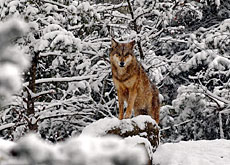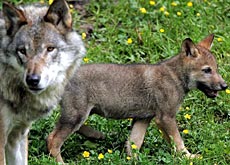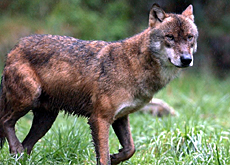Swiss seek to change law on wolf hunting

The WWF has described a Swiss proposal to downgrade the status of wolves from strictly protected to protected as "unacceptable and irresponsible".
The proposal is filed for a meeting of the 1979 Bern Convention on protecting wildlife to be held at the Council of Europe in Strasbourg next week.
The international conservation organisation said on Wednesday that the move to allow some hunting of the animal would undermine hopes for the return of wolf populations in western Europe.
“[The change in status] is irresponsible because it’s far too early,” Joanna Schönenberger, a large carnivore specialist for the WWF’s alpine programme, told swissinfo.
“The Swiss authorities say the wolf is recovering and reproducing fast. But at present there are [only] two to three wolves actually on Swiss territory – two on the Swiss-Italian border and one in canton Graubünden,” she said.
“The wolf is protected by the Bern Convention because it’s an endangered species.”
The four-day meeting in Strasbourg, which will begin discussing the Swiss proposal on Monday, is a session of the Standing Committee of the Bern Convention, which aims to preserve European wildlife in its natural habitat.
Conflict
Swiss officials said they were seeking a change in the wolf’s status under the Convention from “strictly protected” to “protected”, like the lynx.
They say this would enable controlled culling to maintain a manageable population.
They argue the wolf population poses a threat to local communities in mountain areas and to their livestock, especially sheep.
“The aim is to limit the scope for conflict with mountain farming,” said a government official.
Schönenberger appreciated this argument and said she was not in principle against hunting wolves – but not yet.
“Our job is to learn how to protect our herds from attacks from wolves and other animals, such as bears, lynxes and dogs,” she said. “It’s not to reduce the status as soon as we have a wolf or two in the country.”
“Sad day”
Wolves were driven to extinction throughout most of western Europe by the beginning of the 20th century, mostly by hunting and the expansion of human settlements and upland farming into areas in which wolves had ranged free.
But over the past few decades – partly as a result of the Bern Convention – some have returned to the Alps.
Single animals returned to Switzerland from Italy in 1995.
Schönenberger says if the Swiss proposal is accepted it would be a step backwards not just for wolves but for all animals protected by an international convention.
“It would be a sad day,” she said. “As soon as a country has two animals they go and change an international convention – what kind of precedent does that set?”
swissinfo, Thomas Stephens
The Convention on the Conservation of European Wildlife and Natural Habitats was adopted in Bern in September 1979.
45 countries are party to the legal instrument, also known as the Bern Convention, including members and non-members of the Council of Europe.
The wolf became extinct in Switzerland 100 years ago. It reappeared in 1995.

In compliance with the JTI standards
More: SWI swissinfo.ch certified by the Journalism Trust Initiative




You can find an overview of ongoing debates with our journalists here . Please join us!
If you want to start a conversation about a topic raised in this article or want to report factual errors, email us at english@swissinfo.ch.